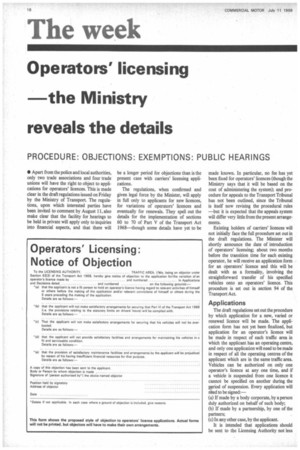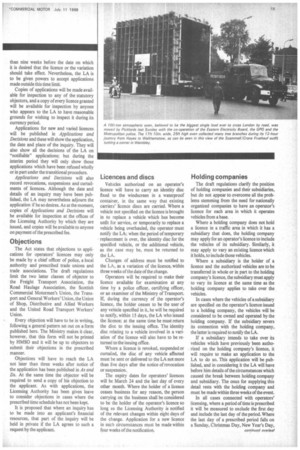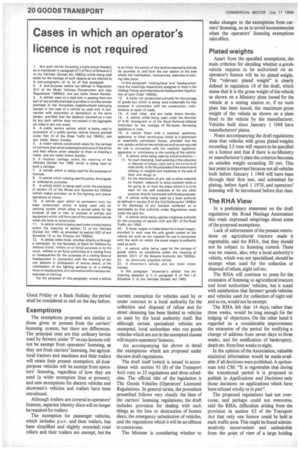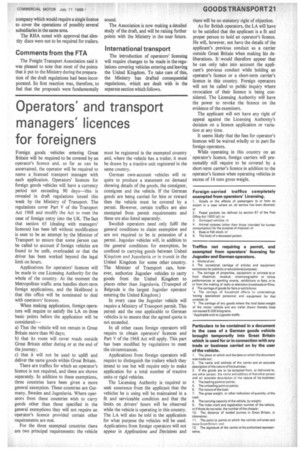Operators' licensing the Ministry reveals the details
Page 20

Page 21

Page 22

Page 23

If you've noticed an error in this article please click here to report it so we can fix it.
PROCEDURE: OBJECTIONS: EXEMPTIONS: PUBLIC HEARINGS
• Apart from the police and local authorities, only two trade associations and four trade unions will have the right to object to applications for operators' licences. This is made clear in the draft regulations issued on Friday by the Ministry of Transport. The regulations, upon which interested parties have been invited to comment by August 11, also make clear that the facility for hearings to be held in private will apply only to inquiries into financial aspects, and that there will be a longer period for objections than is the present case with carriers' licensing applications.
The regulations, when confirmed and given legal force by the Minister, will apply in full only to applicants for new licences, for variations of operators' licences and eventually for renewals. They spell out the details for the implementation of sections 60 to 70 of Part V of the Transport Act 1968—though some details have yet to be made known. In particular, no fee has yet been fixed for operators' licences (though the Ministry says that it will be based on the cost of administering the system); and procedure for appeals to the Transport Tribunal has not been outlined, since the Tribunal is itself now revising the procedural rules —but it is expected that the appeals system will differ very little from the present arrangements.
Existing holders of carriers' licences will not initially face the full procedure set out in the draft regulations. The Minister will shortly announce the date of introduction of operators' licensing; about two months before the transition time for each existing operator, he will receive an application form for an operators' licence and this will be dealt with as a formality, involving the straightforward transfer of his specified vehicles onto an operators' licence. This procedure is set out in section 94 of the Transport Act.
Applications
The draft regulations set out the procedure by which application for a new, varied or renewed licence will be made. The application form has not yet been finalized, but application for an operator's licence will be made in respect of each traffic area in which the applicant has an operating centre, and only one application will need to be made in respect of all the operating centres of the applicant which are in the same traffic area. Vehicles can be authorized on only one operator's licence at any one time, and if a vehicle is suspended from one licence it cannot be specified on another during the period of suspension. Every application will need to be signed: (a) If made by a body corporate, by a person duly authorized on behalf of such body; (b) If made by a partnership, by one of the partners; (c) In any other case, by the applicant. It is intended that applications should be sent to the Licensing Authority not less than nine weeks before the date on which it is desired that the licence or the variation should take effect. Nevertheless, the LA is to be given powers to accept applications made outside this time limit.
Copies of applications will be made available for inspection to any of the statutory objectors, and a copy of every licence granted will be available for inspection by anyone who appears to the LA to have reasonable grounds for wishing to inspect it during its currency period.
Applications for new and varied licences will be published in Applications and Decisions and these will show the application, the date and place of the inquiry. They will also show all the decisions of the LA on "notifiable" applications; but during the interim period they will only show those applications which have been refused wholly or in part under the transitional procedure.
Applications and Decisions will also record revocations, suspensions and curtailments of licences. Although the date and details of an inquiry may have been published, the LA may nevertheless adjourn the application if he so desires. As at the moment, copies of Applications and Decisions will be available for inspection at the offices of the Licensing Authority by which they are issued, and copies will be available to anyone on payment of the prescribed fee.
Objections
The Act states that objections to applications for operators' licences may only be made by a chief officer of police, a local authority and prescribed trade unions and trade associations. The draft regulations limit the two latter classes of objector to the Freight Transport Association, the Road Haulage Association, the Scottish Commercial Motormen's Union, the Transport and General Workers' Union, the Union of Shop, Distributive and Allied Workers and the United Road Transport Workers' Union.
Every objection will have to be in writing, following a general pattern set out on a form published here. The Ministry makes it clear, however, that this form will not be printed by HMSO and it will be up to objectors to submit their objections in the prescribed manner.
Objections will have to reach the LA not later than three weeks after notice of the application has been published in As and Ds. At the same time the objector will be required to send a copy of his objection to the applicant. As with applications, the Licensing Authority has been given leave to consider objections in cases where the prescribed time schedule has not been kept.
It is proposed that where an inquiry has to be made into an applicant's financial resources, that part of the inquiry will be held in private if the LA agrees to such a request by the applicant.
Licences and discs
Vehicles authorized on an operator's licence will have to carry an identity disc fixed to the windscreen in a waterproof container, in the same way that existing carriers' licence discs are carried. Where a vehicle not specified on the licence is brought in to replace a vehicle which has become unfit for service, or temporarily to replace a vehicle being overhauled, the operator must notify the LA; when the period of temporary replacement is over, the identity disc for the specified vehicle, or the additional vehicle, as the case may be, must be returned to the LA.
Changes of address must be notified to the LA, as a variation of the licence, within three weeks of the date of the change.
Operators will be required to make their licence available for examination at any time by a police officer, certifying officer, or an examiner of the Ministry of Transport. If, during the currency of the operator's licence, the holder ceases to be the user of any vehicle specified in it, he will he required to notify, within 15 days, the LA who issued the licence; at the same time he must return the disc to the issuing office. The identity disc relating to a vehicle involved in a variation of the licence will also have to be returned to the issuing office.
Where a licence is revoked, suspended or curtailed, the disc of any vehicle affected must be sent or delivered to the LA not more than five days after the notice of revocation or suspension..
The expiry dates for operators' licences will be March 24 and the last day of every other month. Where the holder of a licence ceases business for any reason, the person carrying on the business shall be considered to be the holder of the operator's licence so long as the Licensing Authority is notified of the relevant changes within eight days of the change. Application for a new licence in such circumstances must be made within four weeks of the notification.
Holding companies
The draft regulations clarify the position of holding companies and their subsidiaries, but do not appear to overcome all the problems stemming from the need for nationally organized companies to have an operator's licence for each area in which it operates vehicles from a base.
Where a holding company does not hold a licence in a traffic area in which it has a subsidiary that does, the holding company may apply for an operator's licence to include the vehicles of its subsidiary. Similarly, it may apply to vary an existing licence which it holds, to include those vehicles.
Where a subsidiary is the holder of a licence and the authorized vehicles are to be transferred in whole or in part to the holding company's licence, the subsidiary must apply to vary its licence at the same time as the holding company applies to take over the vehicles.
In cases where the vehicles of a subsidiary are specified on the operator's licence issued to a holding company, the vehicles will be considered to be owned and operated by the holding company. If the subsidiary severs its connection with the holding company, the latter is required to notify the LA.
If a subsidiary intends to take over its vehicles which have previously been authorized on the holding company's licence, it will require to make an application to the LA to do so. This application will be published, and in considering it the LA will have before him details of the circumstances which caused the break between holding company and subsidiary. The onus for supplying this detail rests with the holding company and must be made within three weeks of the event In all cases connected with operators' licensing, where a period of time is prescribed it will be measured to exclude the first day and include the last day of the period. Where the last day of a prescribed period falls on a Sunday, Christmas Day, New Year's Day,
Good Friday or a Bank Holiday the period shall be considered to end on the day before.
Exemptions
The exemptions proposed are similar to those given at present from the carriers' licensing system, but there are differences. The principal ones are that ordinary lorries used by farmers under 'F' excise licences will not be exempt from operators' licensing, as they are from carriers' licensing, but agricultural tractors and machines and their trailers will retain their present exemption; all dualpurpose vehicles will be exempt from operators' licensing, regardless of how they are used (a wider exemption than at present); and new exemptions for electric vehicles and showmen's vehicles and trailers have been introduced.
Although trailers are covered in operators' licences, separate identity discs will no longer be required for trailers.
The exemption for passenger vehicles, which includes p.s.v. and their trailers, has been simplified and slightly extended; road rollers and their trailers are exempt, but the current exemption for vehicles used by or under contract to a local authority for the collection and disposal of refuse and for street cleansing has been limited to vehicles so used by the local authority itself. But although certain specialized vehicles are exempted, local authorities who run goods vehicles which are not in the exempted classes will require operators' licences.
An accompanying list shows in detail the exemptions which are proposed under the new draft regulations.
The draft itself (which is issued in accordance with section 91(8) of the Transport Act) runs to 23 regulations and three schedules. The official title of the legislation is The Goods Vehicles (Operators' Licences) Regulations. In general terms, the procedure prescribed follows very closely the lines of the carriers licensing regulations; the draft includes provision for dealing with such things as the loss or destruction of licence discs, the emergency substitution of vehicles, and the regulations which it will be an offence to contravene.
The Minister is considering whether to make changes to the exemptions from carriers' licensing, so as to avoid inconsistencies when the operators' licensing exemptions take effect.
Plated weights
Apart from the specified exemptions, the main criterion for deciding whether a goods vehicle requires to be authorized on an operator's licence will be its plated weight. The "relevant plated weight" is clearly defined in regulation 18 of the draft, which states that it is the gross weight of the vehicle as shown on a Ministry plate issued for the vehicle at a testing station or, if no such plate has been issued, the maximum gross weight of the vehicle as shown on a plate fixed to the vehicle by the manufacturer. Vehicles built since January 1 1968 have manufacturers' plates.
Notes accompanying the draft regulations state that vehicles with gross plated weights exceeding 3.5 tons will require to be specified on a licence and that if there is no Ministry or manufacturer's plate the criterion becomes an unladen weight exceeding 30 cwt. This last point is important because not all vehicles built before January 1 1968 will have been through their first test, and submitted for plating. before April 1 1970, and operators' licensing will be introduced before that date.
The RHA View
In a preliminary statement on the draft regulations the Road Haulage Association this week expressed misgivings about some of the proposed exemptions.
Lack of enforcement of the present restrictions on agricultural tractors made it regrettable, said the RHA, that they should not be subject to licensing control. There was no reason, also, why a local authority's vehicle, which was not specialized, should be exempt when used for the collection or disposal of refuse, night soil etc.
The RHA will continue to press for the extension of licensing to agricultural tractors and local authorities' vehicles, but it noted with satisfaction that farmers' goods vehicles and vehicles used for collection of night soil and so on, would not be exempt.
The RHA felt that 14 days, rather than three weeks, would be long enough for the lodging of objections. On the other hand it regarded as a considerable improvement the extension of the period for notifying a change of address from seven days to three weeks, and for notification of bankruptcy, death etc. from four weeks to eight.
In the opinion of the Association, valuable statistical information would be made available if all decisions were published. A spokesman told CM: "It is regrettable that during the transitional period it is proposed to publish in Applications and Decisions only those decisions on applications which have been refused wholly or in part".
The proposed regulations had not overcome, and perhaps could not overcome, said the RHA, difficulties arising from the provision in section 62 of the Transport Act that only one licence could be held in each traffic area. This might be found administratively inconvenient and undesirable from the point of view of a large holding company which would require a single licence to cover the operations of possibly several subsidiaries in the same area.
The RHA noted with approval that identity discs were not to be required for trailers.
Comments from the FTA
The Freight Transport Association said it was pleased to note that most of the points that it put to the Ministry during the preparation of the draft regulations had been incorporated. Its first reaction was, therefore, to feel that the proposals were fundamentally
sound.
The Association is now making a detailed study of the draft, and will be raising further points with the Ministry in the near future.
International transport
The introduction of operators' licensing will require changes to be made in the regulations covering vehicles entering and leaving the United Kingdom. To take care of this, the Ministry has drafted consequential regulations, which are dealt with in the separate section which follows.












































































































